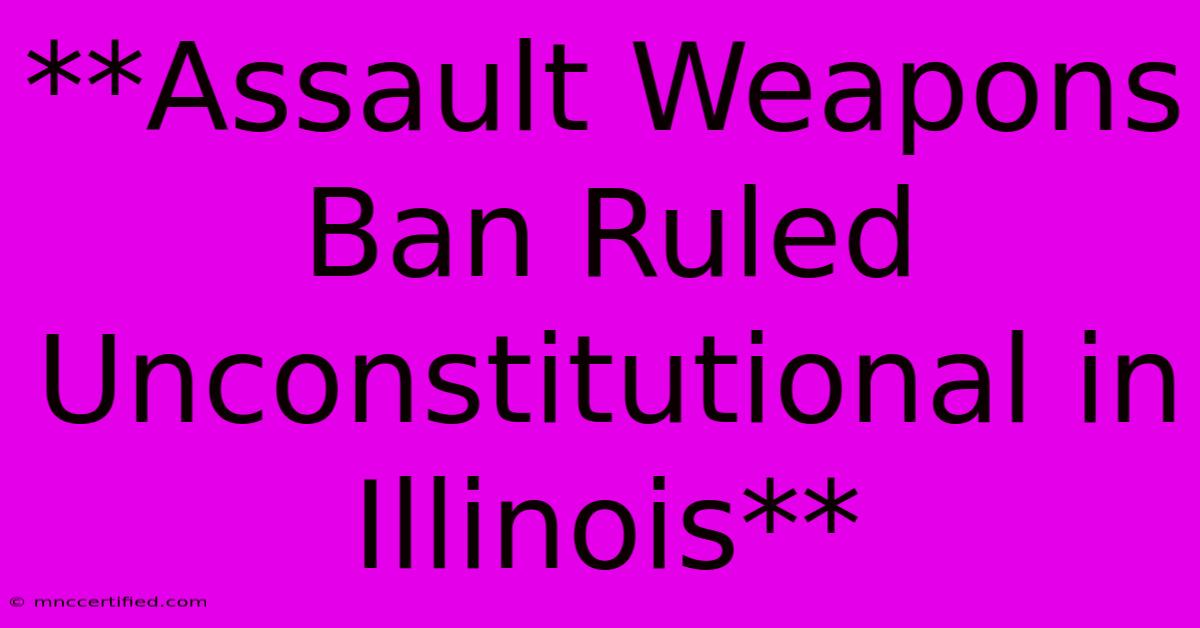**Assault Weapons Ban Ruled Unconstitutional In Illinois**

Table of Contents
Assault Weapons Ban Ruled Unconstitutional in Illinois: What This Means for Gun Control
In a significant legal victory for gun rights advocates, a federal judge in Illinois has ruled that the state's assault weapons ban is unconstitutional. The ruling, issued on June 30, 2023, by Judge Matthew Kennelly of the U.S. District Court for the Northern District of Illinois, strikes down a law passed in 2023 that prohibited the sale, manufacture, and possession of certain semi-automatic firearms.
This decision has far-reaching implications for gun control laws nationwide, as it hinges on the Second Amendment right to bear arms and its interpretation in recent Supreme Court rulings. Let's delve into the details of this landmark ruling and explore its potential ramifications.
The Case Against the Assault Weapons Ban
The case, NRA v. Raoul, was brought by the National Rifle Association (NRA) and other gun rights groups challenging the constitutionality of the Illinois Assault Weapons Ban Act. The plaintiffs argued that the law violated the Second Amendment by banning commonly-owned semi-automatic firearms that are widely used for lawful purposes, including self-defense and sport shooting. They also argued that the law was overly broad and vague, making it difficult for individuals to understand what firearms were prohibited.
Judge Kennelly agreed with the plaintiffs, finding that the Illinois law was unconstitutional under the Second Amendment. He specifically cited the Supreme Court's 2022 decision in New York State Rifle & Pistol Association, Inc. v. Bruen, which held that the Second Amendment protects an individual's right to carry a handgun for self-defense outside the home.
The Court's Reasoning: Historical Analogy and Strict Scrutiny
Judge Kennelly's ruling relied heavily on the Bruen decision, which established a new test for evaluating gun laws. The Bruen test requires courts to determine whether a challenged law is consistent with the historical understanding of the Second Amendment. This means that the law must be similar to laws that were in effect at the time the Constitution was ratified.
Applying the Bruen test, Judge Kennelly found that the Illinois Assault Weapons Ban failed to meet the historical analogy requirement. He noted that the law prohibited firearms that were not commonly owned at the time of the founding of the United States, and that there was no historical precedent for banning such firearms.
He further concluded that the law failed to meet the "strict scrutiny" standard, which means that the government must demonstrate that the law is narrowly tailored to achieve a compelling government interest. The judge found that the state's arguments for the law, such as public safety and reducing gun violence, were not compelling enough to justify the ban.
Implications for Gun Control Laws Nationwide
This ruling has significant implications for gun control laws across the country. It sets a new precedent for challenging gun bans based on the Second Amendment and the Bruen test. While the ruling is specific to Illinois law, it is likely to be cited by other gun rights groups challenging similar laws in other states.
The decision is a victory for gun rights advocates and is likely to fuel further debates about the scope of the Second Amendment. It remains to be seen how other courts will apply the Bruen test and whether this ruling will lead to a broader weakening of gun control regulations across the United States.
Looking Ahead: The Future of Gun Control
This landmark case has sparked intense debate and raised crucial questions about the future of gun control in the United States. It is clear that the Bruen test will be a pivotal factor in shaping future legal challenges to gun laws.
The battle over gun control is likely to continue in the courts and in state legislatures. It is essential for both gun rights and gun control advocates to engage in civil discourse and seek common ground to address the complex issue of gun violence in a way that respects the Second Amendment and promotes public safety.
Keywords: assault weapons ban, Illinois, unconstitutional, Second Amendment, gun control, Bruen test, historical analogy, strict scrutiny, NRA, gun rights, gun violence, public safety, legal challenge, court ruling, Supreme Court, landmark decision

Thank you for visiting our website wich cover about **Assault Weapons Ban Ruled Unconstitutional In Illinois**. We hope the information provided has been useful to you. Feel free to contact us if you have any questions or need further assistance. See you next time and dont miss to bookmark.
Featured Posts
-
Jayhawks Defeat Unc Take National Crown
Nov 09, 2024
-
Lord Mayors Show Live Traffic And Road Closures In London
Nov 09, 2024
-
Meet Our Team Insurance Company In Ohio
Nov 09, 2024
-
Camera Insurance For Non Professionals
Nov 09, 2024
-
Bhad Bhabie Opens Up About Health Issues
Nov 09, 2024